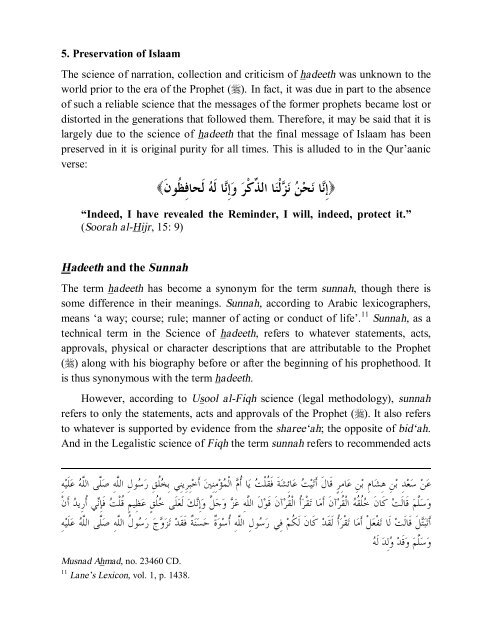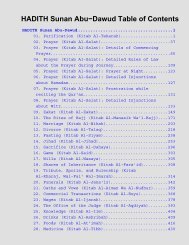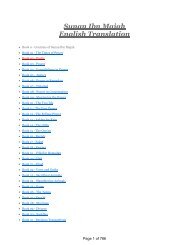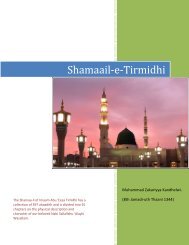You also want an ePaper? Increase the reach of your titles
YUMPU automatically turns print PDFs into web optimized ePapers that Google loves.
5. Preservation of IslaamThe science of narration, collection and criticism of hadeeth was unknown to theworld prior to the era of the Prophet (r). In fact, it was due in part to the absenceof such a reliable science that the messages of the former prophets became lost ordistorted in the generations that followed them. Therefore, it may be said that it islargely due to the science of hadeeth that the fin<strong>al</strong> message of Islaam has beenpreserved in it is origin<strong>al</strong> purity for <strong>al</strong>l times. This is <strong>al</strong>luded to in the Qur’aanicverse:(إِ نا نحن نزل ْنا الذ ِّك ْر وإِنا ل َه ل َحافِظ ُون َ (“Indeed, I have reve<strong>al</strong>ed the Reminder, I will, indeed, protect it.”(Soorah <strong>al</strong>-Hijr, 15: 9)Hadeeth and the SunnahThe term hadeeth has become a synonym for the term sunnah, though there issome difference in their meanings. Sunnah, according to Arabic lexicographers,means ‘a way; course; rule; manner of acting or conduct of life’. 11 Sunnah, as atechnic<strong>al</strong> term in the Science of hadeeth, refers to whatever statements, acts,approv<strong>al</strong>s, physic<strong>al</strong> or character descriptions that are attributable to the Prophet(r) <strong>al</strong>ong with his biography before or after the beginning of his prophethood. Itis thus synonymous with the term hadeeth.However, according to <strong>Usool</strong> <strong>al</strong>-Fiqh science (leg<strong>al</strong> methodology), sunnahrefers to only the statements, acts and approv<strong>al</strong>s of the Prophet (r). It <strong>al</strong>so refersto whatever is supported by evidence from the sharee‘ah; the opposite of bid‘ah.And in the Leg<strong>al</strong>istic science of Fiqh the term sunnah refers to recommended actsعن سعدِ بنِ هِشامِ بنِ عامِرٍ ق َال َ أ َتيت عائِشة َ ف َق ُل ْت يا أ ُم ال ْمؤمِنِ ين أ َخبِرِينِي بِخل ُ قِ رسولِ الل َّهِ صل َّى الل َّه عل َيهِوسل َّم ق َال َت ك َان َ خل ُق ُه ال ْق ُرآن َ أ َما تق ْرأ ُ ال ْق ُرآن َ ق َول َ الل َّهِ عز وجل َّ وإِن ك ل َعل َى خل ُ قٍ عظِيمٍ ق ُل ْت ف َإِني أ ُرِيد أ َن ْأ َتبتل َ ق َال َت ل َا تف ْعل ْ أ َما تق ْرأ ُ ل َق َد ك َان َ ل َك ُم فِي رسولِ الل َّهِ أ ُسوة ٌ حسنة ٌ ف َق َد تزوج رسول ُ الل َّهِ صل َّى الل َّه عل َيهِوسل َّم وق َد ولِد ل َهMusnad Ahmad, no. 23460 CD.11 Lane’s Lexicon, vol. 1, p. 1438.





